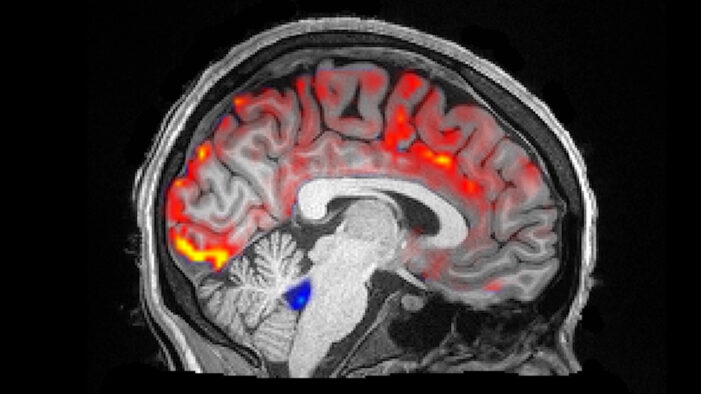Unlocking the mysteries of the human brain has always been a fascinating endeavor. And now, scientific research is shedding light on a remarkable connection between sleep and our brain health. It turns out that getting enough restful slumber can do more than just recharge our batteries–it can actually “clean” our brains and potentially reduce the risk of developing Alzheimer’s disease. Yes, you heard that right! By simply prioritizing sleep, we may take proactive steps toward safeguarding our cognitive well-being in the long run. So, let’s dive into this captivating topic and explore how catching those could contribute to keeping Alzheimer’s at bay.
Contents
- 1 Does sleep flush out brain toxins
- 2 What is Alzheimer’s Disease
- 3 To improve your chances at getting a good night’s rest:
- 4 Symptoms of Alzheimer’s disease
- 5 How to Sleep Better at Any Age
- 6 The Importance of Sleep
- 7 How Sleep Cleans Your Brain
- 8 The Relationship Between Sleep and Alzheimer’s Disease
- 9 To promote better quality sleep:
- 10 Tips for Getting a Good Night’s Sleep
- 11 Conclusion
- 12 NOTE :- So how can you ensure you’re getting a good night’s sleep? Here are some tips:
Does sleep flush out brain toxins
Have you ever wondered what happens to your brain while you sleep? Well, one fascinating aspect is that it goes into a unique mode of “cleaning” itself. During the day, our brains accumulate toxins and waste products that need to be cleared away for optimal functioning. It’s like giving your brain a refreshing shower!
Recent research suggests that this process, called the glymphatic system, becomes more active during sleep. Specialized cells in the brain shrink in size, allowing cerebrospinal fluid to flow through and flush out harmful substances. This includes beta-amyloid plaques – sticky clumps of protein linked to Alzheimer’s disease.
So when you snooze peacefully at night, your brain gets busy eliminating these potentially harmful toxins from its nooks and crannies. It’s almost as if each dream-filled slumber helps reset your mind for another day of clear thinking and cognitive function.
But here’s the catch – inadequate or disrupted sleep can impede this vital cleansing process. Without enough quality shut-eye, those pesky toxins may linger longer than they should, potentially increasing the risk of cognitive decline over time.
Therefore, ensuring sufficient hours of uninterrupted restful sleep could be crucial not only for feeling refreshed but also for giving your brain an opportunity to rid itself of toxic waste accumulated throughout the day.

What is Alzheimer’s Disease
Alzheimer’s Disease is a progressive brain disorder that affects millions of people worldwide. It is the most common form of dementia, accounting for about 60-80% of all cases. The disease primarily affects older adults, although it can also occur in younger individuals.
The exact cause of Alzheimer’s Disease is still not fully understood. However, researchers believe that a combination of genetic, lifestyle, and environmental factors may contribute to its development. One key characteristic of the disease is the accumulation of abnormal protein deposits called beta-amyloid plaques and tau tangles in the brain.
People with Alzheimer’s often experience memory loss and cognitive decline. They may have difficulty remembering recent events or recognizing familiar faces. As the disease progresses, individuals may struggle with language skills, lose their ability to perform everyday tasks independently, and undergo personality changes.
Unfortunately, there is currently no cure for Alzheimer’s Disease. Treatment options mainly focus on managing symptoms and improving quality of life for patients and their caregivers.
Research has shown that sleep plays a crucial role in overall brain health and can potentially decrease the risk of developing Alzheimer’s Disease. Proper sleep allows our brains to clear out toxins accumulated during waking hours through a process known as “brain cleansing.” During deep sleep stages, cerebrospinal fluid flushes away harmful substances like beta-amyloid from our brains.
Several studies have linked poor sleep patterns or disorders such as insomnia with an increased risk of developing cognitive impairments later in life. Chronic sleep deprivation or fragmented sleep disrupts this vital brain cleansing process and may lead to greater buildup of toxic proteins implicated in Alzheimer’s pathology.
Getting enough good-quality sleep should be a priority at any age to maintain optimal brain function and reduce potential risks associated with neurodegenerative diseases like Alzheimer’s Disease.
To improve your chances at getting a good night’s rest:
- Establish consistent bedtime routines
- Create a comfortable sleeping environment
- Limit exposure to screens and stimulating activities before bed
- Engage in regular exercise, but
Symptoms of Alzheimer’s disease
Symptoms of Alzheimer’s disease can vary from person to person, but they generally worsen over time. In the early stages, individuals may experience memory loss and confusion. They may have difficulty remembering recent events or conversations and struggle with completing familiar tasks.
As the disease progresses, more severe symptoms may appear. This includes increased memory loss that disrupts daily life, challenges in problem-solving and planning, difficulty recognizing people or objects, and changes in mood or personality. Individuals with Alzheimer’s may become irritable or withdrawn.
In later stages of the disease, individuals may require assistance with basic activities such as eating, dressing, and bathing. They can lose the ability to communicate effectively or recognize loved ones altogether. Additionally, physical symptoms like difficulty swallowing and walking often arise.
It is important to note that these symptoms can be caused by other conditions as well; therefore a proper diagnosis is crucial for appropriate treatment options and support systems for both patients and their caregivers.
How to Sleep Better at Any Age
Getting a good night’s sleep is essential for overall health and well-being, regardless of age. However, as we get older, our sleep patterns may change, making it more challenging to achieve restful and rejuvenating sleep. Here are some tips to help you sleep better at any age.
Establish a bedtime routine: Creating a consistent pre-sleep ritual can signal your body that it’s time to wind down and relax. Consider activities such as reading a book, taking a warm bath, or listening to soothing music.
Create a comfortable sleep environment: Ensure that your bedroom is cool, quiet, and dark. Invest in a supportive mattress and pillows that suit your preferences. Consider using blackout curtains or an eye mask if external light disrupts your sleep.
Limit screen time before bed: The blue light emitted by electronic devices can interfere with the production of melatonin – the hormone responsible for regulating our internal clock. Try to avoid screens at least an hour before bedtime.
Maintain regular exercise: Engaging in physical activity during the day can promote better quality sleep at night. Aim for moderate-intensity exercises like walking, swimming, or yoga regularly.
Avoid stimulating substances close to bedtime: Caffeine and alcohol can interfere with your sleep cycle. Limit consumption within several hours of going to bed.
Manage stress levels: Stress and anxiety can significantly impact our ability to fall asleep peacefully. Explore relaxation techniques such as deep breathing exercises or mindfulness meditation before bed.
Listen to your body’s cues: Pay attention to signs of fatigue throughout the day and honor them by allowing yourself enough time for restorative slumber each night.
By prioritizing healthy sleeping habits regardless of age, you’re giving yourself the best chance at achieving optimal brain function while reducing potential risks associated with conditions like Alzheimer’s disease.
The Importance of Sleep
Quality sleep is essential for maintaining optimal brain function and overall well-being. While we often prioritize work, socializing, and other activities, it’s crucial to recognize the significance of getting enough rest each night.
During sleep, our brains go through a process called “brain detoxification,” where toxins and waste products are flushed out. This cleansing mechanism helps maintain brain health and prevents the accumulation of harmful substances that could potentially lead to neurodegenerative conditions like Alzheimer’s disease.
In addition to its role in clearing out toxins, sleep is also vital for cognitive functioning. When we’re well-rested, our ability to concentrate, solve problems, make decisions, and retain information improves significantly. On the other hand, lack of sleep can impair these cognitive processes and negatively impact our daily performance.
Moreover, adequate sleep plays a crucial role in regulating mood and emotional stability. Without enough restorative slumber, individuals may experience increased irritability, anxiety or depression symptoms.
Furthermore,it is important not only for physical rejuvenation but also for promoting good mental health.
Sleep deprivation has been linked with an increased risk of developing mental health disorders such as depression5.
Studies have shown that people who suffer from chronic insomnia are more likely than those without sleeping issues to develop psychiatric disorders,such as depression or anxiety6.
Other studies have found that insomnia doubles an individual’s chances of developing depression7.
It’s clear that proper shuteye isn’t just important when it comes to preventing physical illness;it’s also vital in maintaining mental wellbeing too
How Sleep Cleans Your Brain
Sleep is not just a time for rest and rejuvenation; it also plays a crucial role in cleansing your brain. During sleep, the glymphatic system, which is like the brain’s waste disposal system, kicks into high gear. It works by flushing out harmful toxins and waste products that accumulate throughout the day.
When you’re awake, your brain cells are constantly working and producing waste materials as a result of their metabolic activities. These waste products include beta-amyloid plaques, which are linked to Alzheimer’s disease. However, during sleep, the space between brain cells expands, allowing cerebrospinal fluid to flow more freely and effectively remove these toxic substances.
Research has shown that inadequate sleep can lead to an accumulation of these harmful substances in the brain over time. This build-up can impair cognitive function and increase the risk of developing neurodegenerative diseases such as Alzheimer’s.
Getting enough quality sleep is essential for keeping your brain healthy and reducing your risk of developing Alzheimer’s disease or other forms of dementia. So how can you ensure you get a good night’s sleep? Let me share some tips with you:
- Stick to a regular sleep schedule: Try to go to bed and wake up at consistent times every day.
- Create a peaceful sleeping environment: Make sure your bedroom is dark, quiet, and cool.
- Establish bedtime rituals: Engage in relaxing activities before bed such as reading or taking a warm bath.
- Limit exposure to screens before bedtime: The blue light emitted by electronic devices can disrupt melatonin production.
- Avoid caffeine and heavy meals close to bedtime: These can interfere with falling asleep easily.
By prioritizing good quality sleep each night through implementing healthy habits like these ones mentioned above ,you’ll be giving your brain the opportunity it needs to cleanse itself from toxins accumulated throughout the day.
I hope this article provides valuable insight into the relationship between sleep, brain health,and Alzheimer’s disease.
The Relationship Between Sleep and Alzheimer’s Disease
Sleep plays a crucial role in our overall health and well-being. But did you know that getting enough sleep can also decrease your risk of developing Alzheimer’s disease? Numerous studies have shown a strong connection between poor sleep quality and an increased risk of cognitive decline, including the development of Alzheimer’s.
During sleep, the brain goes through a process called “brain detoxification,” where harmful toxins are flushed out. This cleansing process is vital for maintaining optimal brain function and preventing the buildup of amyloid plaques, which are characteristic of Alzheimer’s disease.
Chronic sleep deprivation disrupts this important cleaning process, allowing toxic substances to accumulate in the brain over time. These toxins can damage nerve cells and lead to cognitive impairment.
Furthermore, lack of sleep has been found to negatively affect memory consolidation. During deep sleep stages, memories are consolidated and stored effectively. Without sufficient sleep, these processes are compromised, leading to difficulties with memory formation and retention.
Moreover, disrupted or inadequate sleep has been linked to inflammation in the body, including the brain. Chronic inflammation is believed to contribute to various neurodegenerative diseases like Alzheimer’s.
To promote better quality sleep:
- To promote better quality sleep:
- Establish a regular bedtime routine.
- Create a comfortable sleeping environment.
- Limit exposure to electronic devices before bed.
- Avoid caffeine and heavy meals close to bedtime.
- Engage in relaxation techniques such as meditation or deep breathing exercises before bed.
By prioritizing good quality sleep throughout your life, you can potentially reduce your risk of developing Alzheimer’s disease while improving your overall cognitive health. So why not make adequate restful slumber a priority tonight?
Tips for Getting a Good Night’s Sleep
- Stick to a Routine: Establishing a regular sleep schedule can help regulate your body’s internal clock. Try going to bed and waking up at the same time every day, even on weekends.
- Create a Relaxing Environment: Make your bedroom conducive to sleep by keeping it dark, quiet, and cool. Use blackout curtains or an eye mask to block out light, wear earplugs or use white noise machines to drown out any distracting sounds, and set the temperature between 60-67°F (15-19°C).
- Limit Screen Time Before Bed: The blue light emitted by electronic devices such as smartphones, tablets, and computers can interfere with melatonin production and disrupt your sleep-wake cycle. Avoid using these devices for at least an hour before bedtime.
- Wind Down Before Bedtime: Engage in relaxing activities such as reading a book, taking a warm bath or shower, practicing meditation or deep breathing exercises to signal your body that it is time to unwind.
- Watch What You Consume: Avoid consuming caffeine (found in coffee, tea, and chocolate) or large meals close to bedtime as they can interfere with falling asleep easily.
- Exercise Regularly: Physical activity during the day helps promote better sleep at night but avoid vigorous exercise too close to bedtime as it may increase alertness.
- Manage Stress Levels: High levels of stress can make it difficult to fall asleep peacefully; try incorporating stress-reducing techniques like yoga or journaling into your routine.
Conclusion
Getting enough sleep is crucial for overall health and well-being. Not only does it help to restore our energy levels, but it also plays a vital role in cleansing the brain and decreasing the risk of Alzheimer’s disease.
Alzheimer’s disease is a devastating condition that affects millions of people worldwide. It causes memory loss, cognitive decline, and difficulty performing everyday tasks. While there is no cure for this disease, research has shown that getting sufficient sleep can have a significant impact on reducing the risk of developing Alzheimer’s.
Sleep helps to clear out toxins from the brain that accumulate during waking hours. This process, known as the glymphatic system, flushes out harmful substances such as beta-amyloid plaques which are closely associated with Alzheimer’s disease. By ensuring we get enough quality sleep each night, we give our brains a chance to clean themselves effectively.
The relationship between sleep and Alzheimer’s goes beyond just toxin clearance. Sleep deprivation or poor-quality sleep can lead to increased inflammation in the body and impair cognitive function over time. Chronic lack of sleep has also been linked to an increased risk of other health conditions such as obesity, diabetes, heart disease, and stroke – all factors that may contribute to higher chances of developing dementia later in life.
NOTE :- So how can you ensure you’re getting a good night’s sleep? Here are some tips:
- Establish a bedtime routine: Go to bed at the same time every night and create relaxing rituals like reading or taking a warm bath before bed.
- Create a comfortable sleeping environment: Make sure your bedroom is dark, quiet, cool, and free from distractions.
- Limit caffeine intake: Avoid consuming caffeine late in the day as it can interfere with falling asleep.
- Exercise regularly: Engaging in physical activity during the day promotes better quality sleep at night.
- Manage stress levels: Find healthy ways to cope with stress through activities like meditation or deep breathing exercises.
- Avoid electronic devices before bed: The blue light emitted by screens


I do not even know how I ended up here but I thought this post was great I dont know who you are but definitely youre going to a famous blogger if you arent already Cheers
Very useful information presented in a clear, engaging way.